- Home
- Jude Watson
Star Wars: The Last of the Jedi, Volume 4 Page 4
Star Wars: The Last of the Jedi, Volume 4 Read online
Page 4
“Something like that,” she replied. Her gaze was remote.
“Hmm…what’s next to do, then? You don’t know where they took Ferus?”
“Just that he was arrested.” Trever felt his stomach lurch. He shouldn’t have eaten all those sliders after all. They felt sour in his stomach now.
One of Dex’s four hands came down on his shoulder with surprising gentleness. “There isn’t a place in the galaxy we can’t find him, so don’t you worry.”
“That’s right,” Solace said. “We’ll start with likely prisons and move out from there. We’ll need transports; I don’t have a hyperdrive on my ship.”
“Transports we can get for you,” Dex said.
“That’s a random plan,” Trever pointed out. “By the time you find him, he could be executed a dozen times. What we need is information.”
Solace looked at him, startled. She wasn’t used to being questioned, he guessed. But if a plan was stupid, somebody had to say so, in his opinion.
“Do you have a better idea?” she asked, looking down her nose at him.
Trever felt his irritation flare. “Just give me a minute—it won’t be hard.”
“Now hold on here,” Dex said. “Solace, with due respect, Trever is right. If you go from prison to prison, it could take years. The Empire has more prisons than banthas have ticks. What we need is infiltration.”
Trever noticed that Curran and Keets had quietly entered the room. Curran looked stronger, his glossy hair now smoothed and pulled back into the thick metal ring. His small, furred face was alert. Keets had a bacta bandage on his side and winced as he sat down in a chair.
“It’s time for exposure,” Dex said.
He looked at Oryon, Keets, and Curran. “We’ve lost good friends on this day,” he continued. “The other Erased have gone underground again. I have a sweet spot here, and you’re welcome to share it. It’d be safe, I guarantee that, at least until the Empire feels like looking for us. Then we’ll find another. But…” Dex paused. “It’s time to join the fight, my friends. To fight means you have to risk exposure. We need to resurface.”
Curran nodded. “I was thinking the same thing.”
“I’ve still got my contacts in the Senate,” Keets said.
“And there are a few even in the Imperial Army officer corps who don’t like where they are,” Oryon added. “They might talk.”
“I’ve got friends I can ask, too,” Dex said. “If we do this, we could attract the notice of the Inquisitors. They’ll come looking, no doubt about that.”
The others nodded. They would accept that risk.
“But why?” Trever asked them. “You hardly know Ferus. You just met him a few days ago.”
“Doesn’t matter,” Dex said. “We’re all soldiers in the same fight now. We’ll risk what we have to for our own.”
Trever looked at Dex gratefully. He knew Ferus would be touched by their help. He only hoped Ferus would live long enough to see it.
That night, Ferus’s cell door slid open and the guards threw a body inside. Ferus sat up, leaning on his elbows. The door slid shut and Clive unfolded himself from his tucked position. He dusted off his dirty prison coveralls.
“I don’t know why they have to do that,” he said.
“How’d you manage it?” Ferus whispered.
“There’s a creepy logic to this regime,” Clive answered in a low tone, settling himself next to Ferus. It had been at least two years since Ferus had last seen him. He was thinner, and his thick black hair was cut close to his head. His blue eyes had dark smudges underneath them. Then again, they all looked older.
“When you rule by fear, everyone is afraid of you,” Clive said, lying back and crossing one ankle over his knee. “This can have its advantages. Obviously. I mean, they’re in control of the galaxy, right? But it can offer windows of opportunity for fellows like me. Hence. There’s a chap in the data-works section—not an Imperial guy, just a civilian with a job. He had a slight problem with his program, and I saw him sweat. If you mess up on the job here, you get a boot in the face and a transfer to someplace worse. Does that concept boggle the mind or what? So I fixed it for him on the sly. He owed me a favor. This is it.”
“So what are you in for?” Ferus asked.
Clive stretched out his legs. “I was lying low under one of your excellent false identities—thanks for never charging me, by the way—when I saw an opportunity I couldn’t pass up.”
“Don’t tell me. A little espionage? A tiny theft of an industrial secret?”
Clive grinned. “Something along those lines. The next thing I knew, I was being arrested. They threw me against a wall and put stun cuffs on me. They traced my ID docs and somehow in a burst of their usual efficiency they discovered who I was. That was act three of this space opera, mate. Once they had my real name, they had me. Into the slammer I went. The End.”
But it wasn’t the end. Ferus knew enough about Clive to know that. He’d met Flax in the time before the Clone Wars, when he was still operating his business, Olin/Lands. He and his partner Roan offered their services to whistleblowers, beings who exposed corruption and then found the law did not protect them. Roan and Ferus created new identities for the whistleblowers and their families and also offered protection while they established themselves on new worlds. Clive hadn’t needed their protection—he had honed his own style of defense, with amazing skills Ferus had never seen outside of the Temple.
Using his abilities as a musician, he had often gone unnoticed in bars or parties while he was gathering information or stealing it. It was a living, he would say with a shrug. Once the Clone Wars started, he saw his skills as marketable. Ferus had thought of him immediately after he had been put in charge of an operation on the planet of Jabor. He had recruited Clive and sent him undercover to a Separatist base to work as a double agent. As a result, Ferus had been able to bust a Separatist spy ring that had operated throughout the Mid-Rim. It hadn’t won the war, but it had saved lives.
If there was anybody in the galaxy who he’d want to watch his back—with the exception of Roan or Obi-Wan—it was Clive Flax.
“So what’s the plan?” Ferus asked.
“What plan?”
“The escape plan. I know you have one.”
“You’re right,” Clive admitted easily. “I just need an accomplice. The galaxy smiled on me the day I saw your ugly mug in here. That’s why I kept you alive.”
“You mean you only saved my life so you could use me?”
“Of course, mate. You know I only think about my own sweet self.” Clive grinned at him.
“Tell me the plan,” Ferus said. “I don’t care what it is—I’m in.”
“I’ve been stealing things for months,” Clive said. He reached inside his coveralls and laid out several items on the hard floor.
Ferus looked at them dubiously.
A servodriver.
A spoon.
A droid’s restraining bolt.
A handful of durasteel bits.
“This is what you’re going to break out of prison with?”
Clive picked up one of the tiny bits. “You see this? You put a small object in a piece of equipment in the right way, you can disable it. Disable something, you’ve got a distraction. Sometimes that’s all you need.” He replaced the scrap of metal with something like fondness. “Besides, I had a plastoid datacard, too, but I had to use it to save your sorry neck. The transport ship comes tomorrow for the new load. Are you in or out?”
Ferus gave another glance at the motley group of objects. Sure, they didn’t look like much. But Clive had just saved his life with a datacard.
“I’m in,” he said.
Malorum sat in the cockpit of his private starship on one of the landing platforms of Polis Massa.
There were too many unrelated facts in his brain. He was used to cataloging facts and swiftly reaching conclusions—that’s how smart he was—but now he felt only confusion. He hated confusion.
<
br /> Think, he told himself impatiently.
He suspected that Senator Amidala had been treated here, but he could not locate any evidence of it.
One of his best agents, Sancor, had been killed here. According to the operational head of the med-center, Maneeli Tuun, Sancor had “accidentally” fallen off an observation platform and landed on some lethally sharp surgical instruments.
Accident. Did they take him for a fool?
A source had told him that a Jedi had been the one to take Amidala’s body to Naboo. Of course the galaxy believed the Jedi had killed Amidala, but Malorum knew it was a lie fabricated to slur the Jedi. He didn’t care about that. He cared only about what really happened, because it was information Darth Vader did not have. And any information Vader didn’t have could be used against him.
The funeral…
Malorum tapped his fingers against the cockpit instrument panel. The funeral had been organized in haste. For such a ceremonial people, it was perhaps too hasty.
He leaned over to the nav computer. He set a course for Naboo. His work here was finished. He’d found nothing.
Instinct was telling him that his answers lay there, not with Ferus Olin. He would call in the execution order. The galaxy would have one less Jedi sympathizer in it.
That could only be an improvement.
Trever walked down a warehouse aisle, in between blocks of towering garbage. The smell was overpowering. He could see fat white gaberworms as long as his arm slithering through the waste.
Workers of many species toiled without stopping, shoveling the garbage into a machine that cubed and sanitized it. They wore face masks and gloves, but Trever couldn’t imagine that those helped with the smell or the feel of the garbage.
“Told you you’d regret tagging along,” Keets told him.
“It’s not so bad,” Trever said. “You should have seen my brother’s bedroom.”
The joke slipped out before he could stop it. Keets gave him a quick, sharp look. He hadn’t mentioned his family before. He never mentioned his family. Their lives, their deaths, were his business.
He hated to think about them. He tried not to. It was tough coming from a family of heroes and martyrs. His mother, his father, and his brother had all fought the Empire. They had all been killed. He had no intention of ending as they did, if he could help it.
He sensed the itch in Keets to ask another question—he was a journalist, after all—but Keets said nothing, just kept leading the way down the aisle of the facility toward the friend he called Davis Joness.
Keets had filled Trever in on the background as they took an airbus fifty levels down to the facility. Davis Joness had been an influential and powerful Coruscant administrator. He had remained neutral during the Clone Wars but could not conceal his distaste for the Empire’s new regulations. One day, he ran afoul of the new Imperial leadership and was instantly reassigned to garbage duty.
They found him at the end of the line, using a servoshovel to pick up the hunks of garbage that had fallen from the piles. He wore a bright orange bandanna around his head and boots up to his thighs. His eyebrows shot up over his face mask when he caught sight of Keets.
“Come to give me a hand?” he asked.
“I think I’ll pass.”
“You disappeared.”
“Thought it might be a good idea at the time.”
“Why’d you come back?”
“Usual story. I missed all this.” Keets lifted his arms to take in the towers of garbage.
“Come on—we can’t talk here, there are spies everywhere.” Davis stripped off his gloves and tossed them onto a pile of reeking garbage.
They followed him through a green door to an outside courtyard. Trever took a deep breath of fresher air, trying not to be obvious about it. Unfortunately, Davis smelled almost as bad as the garbage he handled. There was no fresh air to be had in his vicinity.
Davis noticed when Trever moved away slightly. “Occupational hazard,” he said. With a sigh, he sat down on an upended cone of permacrete that served as a stool. “Glad to see a face from the old days, anyway,” he said.
“You gave me some great tips in the past,” Keets said. “Are you still hooked in?”
“Sure, I still keep my fingers on the pulse of Senatorial high jinks,” Davis said with a half-smile. “I just can’t help myself. It’s a blast watching the Senators debate about how many meters wide the Coruscant flag should be while the Emperor plans more death and destruction.”
“So tell me: Where do they send the political prisoners? The worst of the worst?”
“Don’t you mean the best of the best?”
Keets inclined his head, conceding the point.
“I’ve heard about a new prison world. Dontamo. A work prison. The most elite prisoners are sent there. If you know someone who ends up within its walls, forget them. Everybody works and everybody dies.”
Trever clasped his hands behind his back and squeezed, trying to distract himself from believing it.
“It’s not safe here,” Davis told Keets, suddenly looking around. “You’d better go. There are at least three workers here who pass along information. Those are the ones I know about. Your image was taken as you entered; they’ll put it through security if one of the workers tips them off, which they will.”
“I’m already on Malorum’s bad side,” Keets said. “I doubt it can get worse.”
“Well, you’re in luck. He’s on Naboo for the moment, or so I hear. But you’d better get lost anyway.”
Keets turned to go. Then he turned back again. “Why do you stay?”
“I’ve been barred from every profession except this one. I’ve got kids.” He balled his fingers into fists and stared at them, his eyes bloodshot, his face mottled red from exposure to garbage toxins. “What else can I do?”
When Trever and Keets returned, Oryon and Curran were talking to Dex. Solace was studying a holographic star chart.
“We worked a contact in the air control,” Oryon said. “A starship left the landing platform of a Coruscant high-security prison yesterday. It was headed for the Radiant One system.”
“We’ve been reading the star charts,” Dex said. “We can narrow it down to about fifteen prisons. Radiant One is a big system, well beyond the Core.”
“We’re trying out probability theories, trying to rank them in importance so we know where to start,” Curran added.
Trever looked at Keets. They’d already looked up Dontamo on the star charts. It was in Radiant One. This was the confirmation they needed.
“You don’t need to look any longer,” Keets told the others. “We know where he is.” He strode over to the star chart and pointed his finger. “Here.”
“There’s something else you should know,” Dex said reluctantly. “An execution order has gone through for Ferus.”
Silence suddenly filled the room. Trever closed his eyes as he felt them burn. Not again. Not again. Not again.
Not someone he cared about dying at the hands of the Empire.
“No,” he said fiercely, surprised he’d spoken aloud. “We’ll get there in time.”
“I can make it in half a day,” Solace said.
“We’re coming with you,” Oryon and Curran said at the same time.
Solace looked at them, surprised.
“We’re seeing this through,” Keets said.
“It’s like Dex told us,” Oryon said. “It’s time to join the fight.”
The plan was simple. The hard part was doing it.
Ferus lay awake in the darkness, reviewing what Clive had outlined while Clive himself slept in a corner snoring loudly.
Once they were at the factory, Clive would disable a loading machine that transported the huge durasteel cartons onto the transport ship. He simply planned to disable the counting system. The fact that he swore he would be able to do this with a spoon was enough to give Ferus nightmares, so he chose not to dwell on that.
“Inventory,” Clive had
said, explaining his plan. “If you mess up their inventory procedures, they go crazy. They know they’re accountable to some Grand Moffing Toffhead down the line, so it has to be spot-on. So the crates are being loaded, but they’re not being counted. That means they’re going to have to do a manual count. Which means they’ll flip open the bay doors on the transport. And that will give us our chance. After you take care of the main guard and grab his weapon—”
“How am I going to do that?”
“You’ll think of something. The other guards will be checking out the machine and watching the prisoners, because when something goes wrong, they’re afraid everyone will riot.”
“So I take out the guard…”
“By that time I’ll be in position to stop the loader completely. Then you and I get on board using the bay doors, get to the cockpit, throw out the pilots, and take off.”
“There seem to be a number of holes in this plan.”
“Well, nothing’s perfect.”
Ferus thought back on the conversation now as he lay on his back. He trusted Clive, he trusted his instincts—and he also trusted that if he didn’t take this opportunity, he’d be dead.
He closed his eyes but didn’t sleep. It was before dawn when he heard the boots outside. Too early to roust the prisoners for the day.
He could see the gleam in Clive’s eyes. He was wide-awake, listening. “This can’t be good,” Clive whispered.
The boots stopped outside the door. Clive moved fast. He threw himself across the cell and punched Ferus just as the door flew open and the lights were powered up suddenly in an attempt to blind them.
“He stole my boots!” Clive shouted wildly.
“Doesn’t matter now,” the guard smirked.
Ferus was picked up and thrown into a transport cart, a small, locking box they used to move prisoners in and out…to the execution bloc.
It was his time.
The cover closed and locked. Within seconds, they were wheeling Ferus out.
He clutched a restraining bolt in his fingers—the bolt that Clive had passed him when he’d pretended to attack him. He had no idea what to do with it. It was hardly a weapon. But it was something.

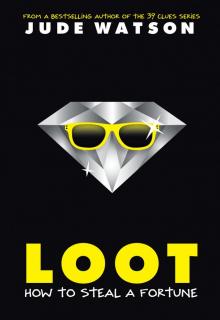 Loot
Loot Star Wars Journal - Captive to Evil by Princess Leia Organa
Star Wars Journal - Captive to Evil by Princess Leia Organa The Final Showdown
The Final Showdown The Death of Hope
The Death of Hope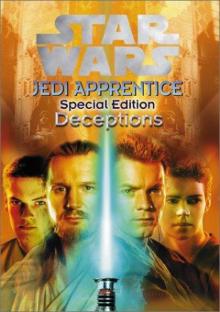 Star Wars - Jedi Apprentice - Special Edition 01 - Deceptions
Star Wars - Jedi Apprentice - Special Edition 01 - Deceptions The Only Witness
The Only Witness The Captive Temple
The Captive Temple The Deadly Hunter
The Deadly Hunter The Evil Experiment
The Evil Experiment Secrets of the Jedi
Secrets of the Jedi The School of Fear
The School of Fear The Master of Disguise
The Master of Disguise The Followers
The Followers The Uncertain Path
The Uncertain Path The Trail of the Jedi
The Trail of the Jedi In Too Deep
In Too Deep The Moment of Truth
The Moment of Truth The Call to Vengeance
The Call to Vengeance Star Wars - Episode I Journal - Queen Amidala
Star Wars - Episode I Journal - Queen Amidala The Ties That Bind
The Ties That Bind The False Peace
The False Peace Dark Warning
Dark Warning Star Wars - The Last One Standing
Star Wars - The Last One Standing The Sight
The Sight The Dangerous Rescue
The Dangerous Rescue The Defenders of the Dead
The Defenders of the Dead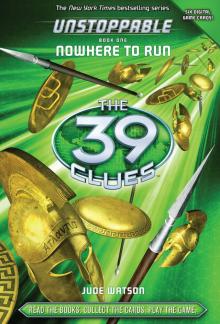 Nowhere to Run
Nowhere to Run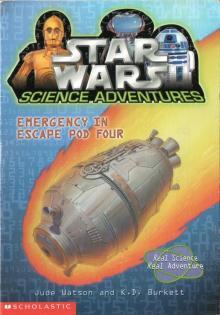 Star Wars Science Adventures 001 - Emergency in Escape Pod Four
Star Wars Science Adventures 001 - Emergency in Escape Pod Four Legacy of the Jedi
Legacy of the Jedi A Warp in Time
A Warp in Time The Mark of the Crown
The Mark of the Crown Underworld
Underworld The Desperate Mission
The Desperate Mission Star Wars - Storm Fleet Warnings
Star Wars - Storm Fleet Warnings The Shattered Peace
The Shattered Peace The Fight for Truth
The Fight for Truth The Shadow Trap
The Shadow Trap Mission Titanic
Mission Titanic The Changing of the Guard
The Changing of the Guard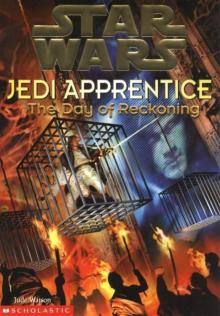 The Day of Reckoning
The Day of Reckoning Death on Naboo
Death on Naboo Star Wars - Episode I Journal - Darth Maul
Star Wars - Episode I Journal - Darth Maul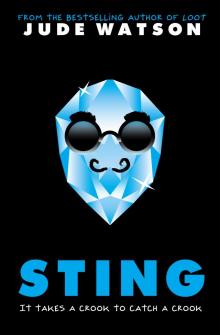 Sting
Sting Star Wars - Jedi Apprentice 03 - The Hidden Past
Star Wars - Jedi Apprentice 03 - The Hidden Past The Threat Within
The Threat Within Star Wars Science Adventures 002 - Journey Across Planet X
Star Wars Science Adventures 002 - Journey Across Planet X Star Wars: The Last of the Jedi, Volume 9
Star Wars: The Last of the Jedi, Volume 9 Star Wars: The Last of the Jedi, Volume 4
Star Wars: The Last of the Jedi, Volume 4 In Too Deep - 39 Clues 06
In Too Deep - 39 Clues 06 Jedi Quest 8: The Changing of the Guard (звёздные войны)
Jedi Quest 8: The Changing of the Guard (звёздные войны) Jedi Quest 9: The False Peace (звёздные войны)
Jedi Quest 9: The False Peace (звёздные войны)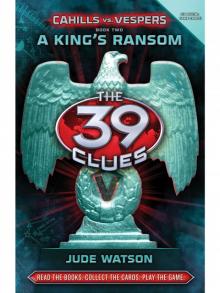 The 39 Clues: Cahills vs. Vespers Book 2: A King's Ransom
The 39 Clues: Cahills vs. Vespers Book 2: A King's Ransom Jedi Quest 6: The Shadow Trap (звёздные войны)
Jedi Quest 6: The Shadow Trap (звёздные войны) Star Wars: The Last of the Jedi, Volume 3
Star Wars: The Last of the Jedi, Volume 3 Jedi Quest 5: The School of Fear (звёздные войны)
Jedi Quest 5: The School of Fear (звёздные войны)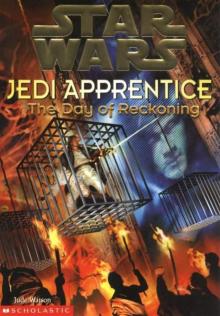 Star Wars - Jedi Apprentice #8 - The Day of Reckoning
Star Wars - Jedi Apprentice #8 - The Day of Reckoning Jedi Quest 0: Path to Truth (star wars)
Jedi Quest 0: Path to Truth (star wars) Star Wars: The Last of the Jedi, Volume 2
Star Wars: The Last of the Jedi, Volume 2 Jedi Quest 2: The Trail of the Jedi (звёздные войны)
Jedi Quest 2: The Trail of the Jedi (звёздные войны) Star Wars - Jedi Apprentice 04 - The Mark of the Crown
Star Wars - Jedi Apprentice 04 - The Mark of the Crown Jedi Quest 7: The Moment of Truth (звёздные войны)
Jedi Quest 7: The Moment of Truth (звёздные войны) Jedi Quest: Path to Truth
Jedi Quest: Path to Truth Star Wars - Jedi Apprentice 09 - The Fight For Truth
Star Wars - Jedi Apprentice 09 - The Fight For Truth Jedi Quest 1: The Way of the Apprentice (star wars)
Jedi Quest 1: The Way of the Apprentice (star wars) Star Wars: The Last of the Jedi, Volume 5
Star Wars: The Last of the Jedi, Volume 5 Star Wars - Jedi Apprentice 05 - The Defenders of the Dead
Star Wars - Jedi Apprentice 05 - The Defenders of the Dead Star Wars - Jedi Apprentice 06 - The Uncertain Path
Star Wars - Jedi Apprentice 06 - The Uncertain Path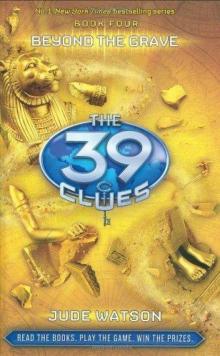 Beyond the Grave - - 39 Clues 04
Beyond the Grave - - 39 Clues 04 CLONE WARS SHORT STORY COLLECTIONS
CLONE WARS SHORT STORY COLLECTIONS Jedi Quest 10: The Final Showdown (звёздные войны)
Jedi Quest 10: The Final Showdown (звёздные войны) Jedi Quest 4: The Master of Disguise (звёздные войны)
Jedi Quest 4: The Master of Disguise (звёздные войны) Star Wars - Jedi Apprentice #2 - The Dark Rival
Star Wars - Jedi Apprentice #2 - The Dark Rival